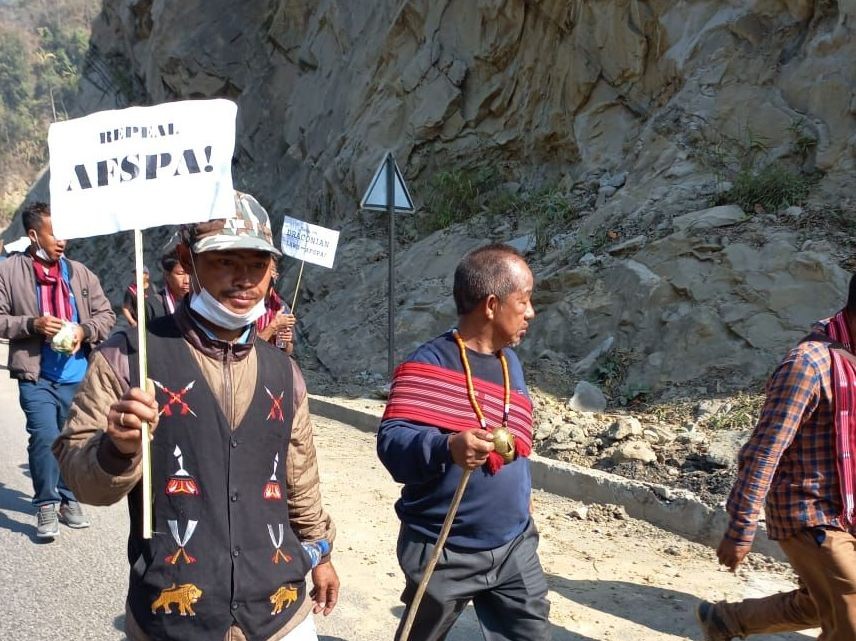Morung File Photo

• Fully withdrawn from Tuensang, Shamator and Tseminyu
• Partial withdrawal in Kohima, Wokha, Mokokchung and Longleng
Morung Express News
Dimapur | March 31
The controversial Armed Forces Special Powers Act (AFSPA) has been withdrawn from three districts in Nagaland, while it was partially revoked from 4 others. Home Minister, Amit Shah made the announcement in an afternoon tweet on March 31 informing that the Narendra Modi-led government has decided to reduce the extent of Disturbed Areas “under Armed Forces Special Powers Act (AFSPA) in the states of Nagaland, Assam and Manipur after decades.”
He pinned the move on “improved security situation” in the North-East and efforts made by the Prime Minister to bring lasting peace in the region.
It was followed by the Press Information Bureau posting a press release wherein it reiterated Shah’s message. The release cited comparative assessment of security data from 2014 to 2021, stating that there has been a 74 percent reduction in violence in the NE region from 2014 till 2021. “Similarly, deaths of security personnel and civilians have also come down by 60 percent and 84 percent respectively during this period,” it said.
The averred improvement in situation “has resulted in a significant step by the Government of India to reduce the disturbed areas under AFSPA” in the three NE states, it added.
According to the PIB release, Shah has continuously been in dialogue with all the NE states, as result of which, most of the political groups in the region have laid down arms. It said, “Today all these persons have become a part of the democratic process and are participating in the peace and development of the North East. About 7,000 militants have surrendered in the last few years.”
It made mention of the January 2020 Bodo Accord and Karbi-Anglong Agreement of September 2021. Similarly, it said that the agreement signed with the NLFT (SD) in August 2019 in Tripura resulted in resolving the 23 year-old Bru-Reang refugee crisis. “On March 29, 2022, another important agreement was signed regarding the boundaries of Assam and Meghalaya,” it added.
While stating that the Disturbed Area notification has already been removed from Meghalaya and Tripura, it informed that beginning April 1, 2022, the AFSPA will be completely revoked from 23 districts and partially from 1 district in Assam.
In Manipur, wherein the Act was effect in the entire state, except the Imphal Municipal area, it will be removed from areas falling under 15 police stations in 6 districts. In Arunachal Pradesh, the extent of the AFSPA was reduced to 3 districts and in 2 police station areas in 1 other district.
Withdrawal in Nagaland
The PIB release said the Disturbed Area Notification, in force since 1995, is being withdrawn from 15 police stations in 7 districts in Nagaland with effect from April 1, 2022. It cited the GoI accepting “the recommendation of a committee constituted in this context for withdrawal of AFSPA in a phased manner.”
The districts from where the AFSPA notification will be revoked were not listed in the release. In what appeared to be a game of phased announcements, about an hour following the PIB release, state Minister of Civil Aviation and Railways, P Paiwang Konyak, who is also BJP lesgislator, posted on Twitter listing the name of the 7 districts.
When contacted, he declined to reveal further details, stating that the Chief Secretary or the DGP would be the officials to talk to.
It was the Nagaland Chief Secretary, J Alam, who finally confirmed the list of districts. As listed by Paiwang, Alam disclosed that the AFSPA notification will be revoked completely from Tuensang, Shamator and Tseminyu districts, while it will be partially withdrawn from Kohima, Wokha, Mokokchung and Longleng districts. It will remain in effect in 9 other districts. According to him, the GoI has not indicated why it has left out the other districts.
He informed that the gazette notification will be published by Thursday evening and it will come into effect from midnight (12:00 am).
Initial reaction: Repeal, not reduce
A significant move on the part of the GoI, it however did not come without critique when The Morung Express reached out to commentators. Advisor to the Naga Mothers Association, Rosemary Dzüvichu, held that it may well be an “appeasement gesture” now that the state Assembly elections are approaching.
According to her, the demand of the Naga people has been the repeal of the AFSPA given a history of massacres and serious violations of human rights under the draconian Act. She termed the partial withdrawal as “another method of militarisation of the other districts under false pretences,” while stating that the Nagas have yet to get “justice on the hundreds and thousands of victims of army atrocities, including the Oting massacre.”
She added, “We have lived with too much militarisation and deaths to settle for anything less than repealing the AFSPA. Any peace accord signed under the shadow of AFSPA will be an accord under duress.”
Neingulo Krome, Secretary General of the Naga Peoples’ Movement for Human Rights commented, “It is good to know there is a relaxation of some sorts. But mere appeasement policies do not help. The situation calls for scrapping of the law and removal of the military and all para-military forces from all civilian areas.”
The Eastern Nagaland Peoples Organisation and the Konyak Union reserved their comment for later. The Presidents of both the organizations said that they would have to consult before commenting on the matter.






